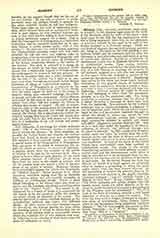
Alimony
Allowance which by order of the court a husband pays to his wife for her maintenance while she is living separately from him

Alimony (Lat., alimonia, nutriment, from alere, to nourish), in the common legal sense of the word, is the allowance which by order of the court a husband pays to his wife for her maintenance while she is living separately from him, or the allowance or provision ordered by the court to be paid by her former husband to a divorced woman. There are two kinds of alimony, the one kind, alimony pendente lite, being an allowance to the wife pending a suit between herself and her husband, and the other the allowance or provision after suit, and which is known as permanent alimony. Exclusive jurisdiction of matrimonial causes was in England formerly vested in ecclesiastical courts. These courts, notwithstanding the English common law, by which the property of a wife became on marriage the property of her husband, assigned to a wife who was compelled to live apart from her husband a portion of his income for her maintenance or alimony. Regulating their action by the canon law, these courts confined themselves to two general classes of matrimonial cases: suits for separation (divorce a mend et toro), and suits to have a marriage declared void from the beginning. Alimony pendente lite might be allowed in a suit belonging to either class, but permanent alimony in a suit for separation only. For, being incidental to marriage, alimony was not allowed in a decree declaring a marriage to have been void from the beginning. Nonpayment by the husband subjected him to excommunication, a judgment of the ecclesiastical court which the executive department of the civil government enforced through its officer, the sheriff, to whom was issued the writ de excommunicato capiendo, reciting that “potestas regia sacrosanctae ecclesiw in querelis suis deesse non debet” (Registrum omnium brevium, 65). And so it is said that under the appellation of estovers, collection of alimony was enforced through writ de estoveriis habendis. In 1857, jurisdiction in matrimonial cases was taken by statute from the ecclesiastical courts, and the court of divorce and matrimonial causes, with power to grant absolute divorce, was established. In none of the states of the United States have matrimonial cases been confided to ecclesiastical courts. The courts in the several states having jurisdiction to award alimony in matrimonial cases and the circumstances under which it may be awarded are to be ascertained from the constitution, the statutes, and the decisions of the courts of each state. By the ancient Roman law there was allowed on behalf of a pupil against an unfaithful tutor or curator a proceeding in which the pupil might obtain what has been termed alimony. In this proceeding it became the praetor’s duty to fix the character and amount of the pupil’s expenses, “decernere alimenta”, “and if”, remarks Cumin (“A Manual of Civil Law“, 2d ed., London, 1865, 79), “the tutor appeared and falsely alleged that the pupils means would not allow alimony to be decreed, he would be removed as suspectus and delivered to the Praejectus urbis for punishment.” The Civil Code of the State of Louisiana contains a very broad definition of alimony as a claim for support. The term has been used in English literature in the general sense of nourishment. Thus Jeremy Taylor refers to the Sacraments being considered “spiritual alimony.” See “A New English Dictionary on Historical Principles,” by J. A. H. Murray, Oxford, New York, 1888, s.v. “Alimony.”
CHARLES W. SLOANE

